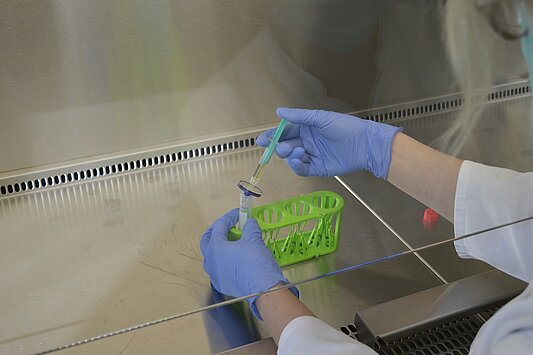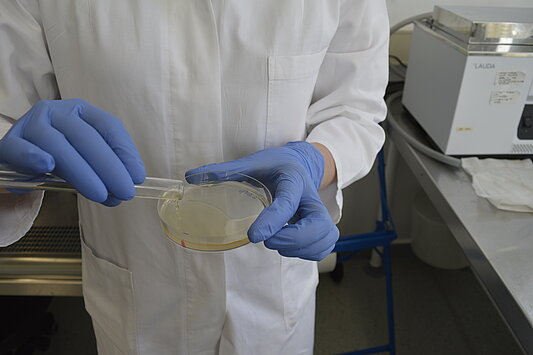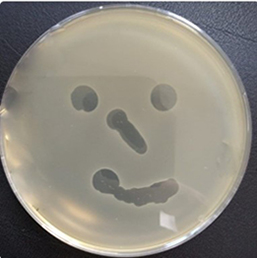Projects
Preventive healthcare across production stages in poultry production - Minimizing the use of antibiotics by phage therapy (MideAPhage; coordinator)
Duration: 2023-2026
Third-party funded project, supported by the Federal Office for Agriculture and Food.
Future-VET - Strategic location development of the University of Veterinary Medicine Hannover Foundation - Pillar 1 of the target agreement 2023/24 (Measure 2A)
Duration: 2023-2026
Third-party funded project, supported by the Ministerium für Wissenschaft und Kultur Niedersachsen
Extension of shelf life and improvement of food safety through the combined use of phages with vacuum or modified atmosphere packaging for pork and chicken products
Duration: 2024-2026
Third-party funded project, supported by the Fritz-Ahrberg-Stiftung
Phage training to improve the practical suitability of phages for use on raw meat.
Duration: 2023-2024
Third-party funded project, supported by the Volkswagen Stiftung
Investigation of phages for innovative mitigation of antibiotic use in dairy farming
Duration: 2022-2024
Third-party funded project, supported by the Landesverband Niedersächsische Milchwirtschaft e.V.
Kontred - Joint project: Development and implementation of technological processes for the reduction of microbial contaminants in the poultry and pig slaughtering process
Duration: November 2020 to November 2023
Third-party funded project, supported by the German Federal Ministry of Food and Agriculture
PAC-CAMPY - Prevention and Control of Campylobacter Infections - A "One-Health" Approach - Specific intervention strategies to reduce Campylobacter along the food chain- second Funding Phase
Duration: October 2020 to September 2022
Third-party funded project, supported by the German Federal Ministry of Education and Research.
Pathways of L. monocytogenes into the food chain - occurrence in silages and possible minimization strategies
Duration: May 2020 until December 2021
Third-party funded project, supported by the Dr. Eberhard Lienhop Foundation
PAC-CAMPY - Prevention and Control of Campylobacter Infections - A "One-Health" Approach - Specific intervention strategies to reduce Campylobacter along the food chain - first funding phase.
Duration: November 2017 to November 2021
Third-party funded project, supported by the German Federal Ministry of Education and Research.
Characterization of Campylobacter-specific bacteriophages and assessment of their application under the aspect of food safety
Duration: August 2017 to August 2020
Third-party funded project, supported by LVL Lebensmittel und Veterinärlabor GmbH, Emstek.
Antimicrobial effect of food cultures on Campylobacter
Duration: March 2017 to February 2020
Third-party funded project, supported by QS-Wissenschaftsfonds.
Reduction of the use of antibiotics in poultry farming by bacteriophages
Duration: January 2016 to June 2018
Third-party funded project, supported by the German Federal Environmental Foundation
BACTERIOPHAGES- THE NATURAL ENEMIES OF BACTERIA
Bacteriophages (phages) are, in the biological sense, viruses that are the natural enemies of bacteria. They are found everywhere in the environment where their host bacteria are also found. Phages exhibit several characteristics that make them exciting and promising candidates for antimicrobial therapy. For example, phages exhibit high host specificity for certain bacteria and consequently can kill pathogenic germs without negatively affecting human health or their natural microflora.
As part of our research, we isolate new phages from different sample matrices such as fecal or food samples using appropriate bacterial strains. The phages are then purified, characterized and tested for their antibacterial efficacy. In this way, we have already been able to identify effective phages for use against various foodborne pathogens such as Campylobacter, Salmonella and E. coli.
BACTERIOCINS- THE NATURAL DEFENSE SUBSTANCES OF BACTERIA
Bacteriocins are peptides or proteins secreted by bacterial strains to inhibit the growth of other bacteria. They are also produced by many bacteria used as probiotics. The use of bacteriocins represents a promising antimicrobial strategy because the sensory properties of foods are not affected by their use.
In our research work, we are investigating a wide variety of bacteria for the formation of new bacteriocins and testing their suitability for use against different foodborne pathogens such as Campylobacter, Salmonella and E. coli.
ORGANIC ACIDS- WELL KNOWN MEASURES REDISCOVERED
Organic acids such as formic, acetic, sorbic or benzoic acid have been used for many years as preservatives in food production due to their antimicrobial activity. In addition, organic acids can also help to reduce the entry of pathogenic germs into the food chain in primary production.
In our research work, we are trying to develop optimized organic acid combinations for use against foodborne pathogens such as Campylobacter and to reduce possible resistance development.
EQUIPMENT OVERVIEW
LightCycler®480 II (Roche Diagnostics International Ltd)
- Real-time PCR
- 5-channel measurement (multiplex)
- Melting curve analysis
- Sample throughput: 96 per application
NanoDrop ONE (Thermo Scientific)
- UV-Vis spectrophotometer
- Quantification of DNA, RNA, proteins
- Purity analysis
Block cycler (Analytik Jena)
- Standard PCR
- Temperature gradient
- Restriction analysis
Mini Protean TetraSystem (BioRad)
- Western blot analysis
Qubit Fluorometer (Thermofisher)
- Concentration determination DNA, RNA
PFGE System
- Length determination of DNA pieces of chromosomal length
- Typing of bacterial genomes
ArrayMate (Alere)
- Antibody characterization, genotyping of organisms
Anaerobic workstation (dw scientific)
- Cultivation of anaerobic microorganisms
Microplate Reader (Tecan Spark)
- Absorbance measurement in microplate format
- Generation of bacterial growth curves





